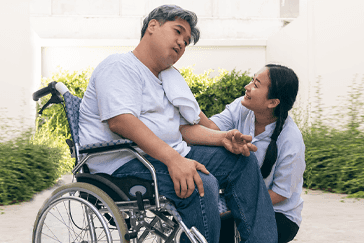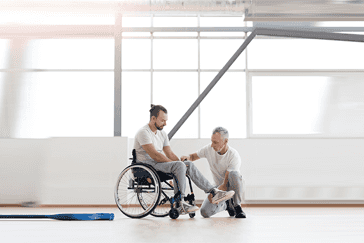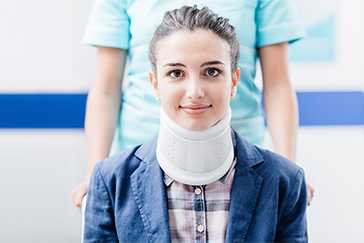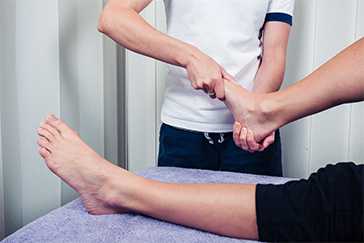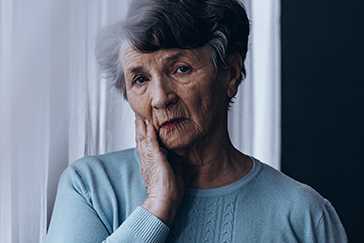
Expert Physiotherapy at Home
Certified physiotherapists visit you at home to provide focused, one-on-one care tailored to your needs. With no travel or waiting rooms, recovery happens in a setting that is comfortable, familiar, and built around your convenience.
Personalised Recovery Programmes
Every treatment plan is designed to suit your condition, goals, and pace. Our physiotherapists follow structured, evolving protocols to ensure consistent progress, with each session aligned to deliver meaningful results.
Trusted Physiotherapists. Real Results.
Our team comprises experienced, background-verified physiotherapists trusted by thousands of families. With a strong focus on safety, reliability, and clinical outcomes, we make recovery at home both effective and reassuring
Patient Testimonials
Portea Physiotherapists for Home Visits
Meet some of our experienced and dedicated healthcare professionals

Dr. Lokesh G
Physiotherapist
Specializations
Experienced in Neurological rehabilitation, Orthopaedic physiotherapy, and Paediatric care
Delivers structured, high-impact treatment plans across neuro, ortho, and paediatrics—ensuring safety, comfort, and measurable recovery at every stage.
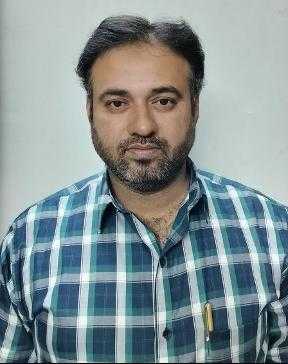
Dr. Mohammed Sarwar
Physiotherapist
Specializations
Experienced in Neurological rehabilitation, Adult physiotherapy, and Paediatric care
Combines deep clinical expertise with a compassionate approach, supporting both adults and children through neuro and physical rehabilitation that promotes long-term independence and recovery.

Dr. Nelapati Divya
Physiotherapist
Specializations
Skilled in Orthopaedic rehabilitation, Manual therapy techniques, and Paediatric physiotherapy
Brings a personalised, hands-on approach to healing—combining structural expertise with paediatric sensitivity to restore movement, relieve pain, and improve everyday function.

Dr. Naveen V
Physiotherapist
Specializations
Trained in Pain management, Cardiac and Orthopaedic rehabilitation, Neurological care, and Neural tissue mobilisation
Brings clinical precision and empathy together—designing science-backed recovery protocols for pain relief, nerve mobilisation, and cardio-neuro-ortho rehabilitation across all age groups

Dr. Miloni Savla
Physiotherapist
Specializations
Holds an MPT in Orthopaedics with a focus on Musculoskeletal rehabilitation and strength recovery
Delivers focused, movement-oriented therapy grounded in orthopaedic science—helping patients rebuild strength, restore function, and return to daily life with confidence
Other Cities
Physiotherapy Treatments

what is stroke paralysis?
Stroke paralysis refers to the loss of muscle movement or control resulting from a stroke. It occurs when the part of the brain responsible for movement becomes damaged and can no longer send signals properly to the muscles. As a result, certain muscle groups become immobile.
Typically, stroke paralysis affects the opposite side of the body from the side of the brain that was damaged. Around 90% of stroke patients experience some form of paralysis, ranging from mild weakness to complete immobility. Recovery may be possible through a combination of physiotherapy, medications, and targeted rehabilitation exercises.
causes of stroke paralysis
There are three primary types of strokes that can lead to paralysis:
1. Transient Ischemic Attack (TIA)
- Often called a mini-stroke, it happens when blood flow to the brain is temporarily blocked.
- Symptoms are brief and usually resolve without lasting damage.
2. Ischemic Stroke
- Caused by a blood clot obstructing blood flow to the brain.
- May result from atherosclerosis (fat deposits in blood vessels) or an embolic stroke (clot from elsewhere in the body, often due to irregular heart rhythm).
- Requires immediate medical attention to restore blood flow and limit brain damage.
3. Hemorrhagic Stroke
- Occurs when a blood vessel ruptures, spilling blood into surrounding brain tissue.
- Causes include:
- Aneurysm: A weakened artery that balloons and bursts.
- Arteriovenous Malformation (AVM): Abnormal blood vessel formation.
- Intracerebral Hemorrhage: Often linked to high blood pressure causing bleeding inside the brain.
These Might be of Interest
symptoms of stroke paralysis
Symptoms depend on the severity of the stroke and the area of the brain affected. Common signs include:
- Sudden Weakness or Numbness (usually on one side of the body)
- Loss of Coordination or Balance
- Difficulty with Speech or Swallowing
- Facial Drooping (asymmetrical smile)
- Blurred or Double Vision
- Severe Headache (typically with hemorrhagic stroke)
- Muscle Spasms or Stiffness (spasticity)
- Loss of Sensory Function (inability to feel pain, temperature, or touch)
prevention of stroke paralysis
To reduce the risk of stroke and related paralysis, adopt the following preventive measures:
1. Maintain a Healthy Diet
- Eat fruits, vegetables, lean proteins, and whole grains.
- Limit sodium, sugar, and trans fats.
2. Engage in Regular Exercise
- Aim for 30 minutes of moderate exercise daily, such as walking or swimming.
3. Control Blood Pressure
- Monitor regularly and follow prescribed treatments.
4. Manage Diabetes
- Keep blood sugar levels stable with diet, exercise, and medication.
5. Maintain a Healthy Weight
- Achieve and maintain weight through lifestyle changes.
6. Manage Stress
- Use techniques like meditation, yoga, or deep breathing.
7. Regular Health Checkups
- Monitor conditions like hypertension, high cholesterol, and atrial fibrillation.
8. Follow Medical Advice
- Take prescribed medications for blood pressure, cholesterol, or clot prevention.
how can physiotherapy help after a stroke?
Physiotherapy plays a vital role in stroke rehabilitation by:
- Restoring movement and muscle tone
- Improving coordination and balance
- Enhancing mobility and preventing stiffness
Role of Neurophysiotherapists
These specialists focus on neurological rehabilitation and help patients regain function using the principle of neuroplasticity—the brain’s ability to reorganize and compensate for damage.
how long does stroke paralysis last?
There’s no fixed timeline for recovery. It depends on:
- The severity of the stroke
- The timeliness and consistency of therapy
- The individual’s overall health and motivation
Improvement can be seen within six months for many, though full recovery may take longer.
when do you need us?
Our expert physiotherapists provide personalized in-home care for stroke paralysis. Early intervention is key. With proper guidance:
- Exercises can be safely initiated
- Movement is gradually restored
- Risk of complications is minimized
how can we help?
We begin by assessing your medical history and current condition to develop a tailored recovery plan. Our physiotherapy sessions are designed to:
- Improve blood circulation
- Restore muscle function
- Accelerate recovery through consistent practice
We walk with you on the path to independent movement and long-term well-being.
about our brand – portea
Portea Medical is India’s leading provider of in-home healthcare services, trusted by thousands of families for expert, accessible, and compassionate care. With a strong network of qualified professionals and a patient-first approach, we bring hospital-quality physiotherapy to your doorstep—especially crucial in conditions like stroke paralysis.
Our specialized neuro-physiotherapists are trained to work with stroke survivors to restore mobility, reduce complications, and speed up recovery through carefully tailored therapy plans. At Portea, we combine clinical expertise with empathy, ensuring every patient gets the dignity, attention, and personalized support they deserve.
Why Choose Portea for Stroke Paralysis Care?
- Expert in-home physiotherapy sessions
- Customized rehabilitation programs
- Focus on neuroplasticity-driven recovery
- Regular progress assessments
- Trusted by doctors and hospitals across India
faq’s
1. What is the difference between stroke and stroke paralysis?
A stroke is a medical condition caused by interrupted or reduced blood flow to the brain. Stroke paralysis is one of the common outcomes of a stroke, where certain parts of the body lose movement due to brain damage.
2. Can stroke paralysis be reversed?
While it cannot always be fully reversed, many patients recover significant function through early intervention, rehabilitation, and consistent physiotherapy. The brain’s neuroplasticity helps compensate for the damaged areas.
3. How soon should physiotherapy start after a stroke?
Physiotherapy should ideally begin within 24 to 48 hours after a stroke, once the patient is stable. Early movement significantly improves the chances of a faster and fuller recovery.
4. Is stroke paralysis always permanent?
No. The degree and duration of paralysis vary by individual. With proper care and rehabilitation, many stroke survivors recover full or partial mobility.
5. Which side of the body does stroke paralysis affect?
Paralysis typically affects the opposite side of the body from where the brain was damaged. For example, a stroke in the left hemisphere may cause paralysis on the right side of the body.
Doctor Consultation
Nursing
Physiotherapy
Trained Attendant
Elder Care
Mother & Baby Care
Lab Tests
Medical Equipment
Speciality Pharma
Critical Care
